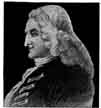
Henry Fielding had a unique way of portraying religion in his works, even though he many times reiterated some common satires. His portrayal of Mary, the Female Husband, as a Methodist, pointed to the fact that he like many others believed that Methodists were using the Justification of Faith doctrine to do whatever they wanted. In his other works as well, Fielding mentions Methodism. Shamela, which was a spoof on Samuel Richardson’s Pamela, featured Shamela’s mother as a whore who sent her daughter Whitefield’s sermons. Fielding mocks Richardson’s pious novel by making Shamela’s character a religious joke, a sham, whose mother is a Methodist. A Methodist is by satirical nature a hypocrite, and Fielding created a hypocritical character with her roots in Methodism. In Tom Jones, Fielding has Tom Jones stay at the Bell’s Inn, the place of birth of George Whitefield. He also adds that the Inn remains untainted by the "pernicious principles of Methodism."
Fielding also mentioned the Jacobite rebellions in his novel, which was written during many uprisings in England. There are several political discourses in which Tom Jones insists that "a popish priest" was not to be believed and that he would uphold his Protestant religion. When Partridge, a secret Jacobite, discusses prophecies that a "Popish priest" told him about bloodshed further on, Tom puts him down by saying "With what stuff and nonsense hast thou filled thy head? This too, I suppose, comes from the popish priest…" (Fielding 379). Earlier in the novel, Jones volunteers to fight for the Protestant cause (before he gets wounded by a sword) saying "I think no man can engage in a nobler cause than that of his religion" (316).
Religious hypocrites are rampant in his novels as well. Reverend Mr. Twackum in Tom Jones is an obvious sadist who enjoys beating religion into young Tom. Twackum does his best to try to portray Tom in a bad light to Mr. Allworthy, eager to make him hate him. In Joseph Andrews, Parson Adams is shocked to learn that a fellow priest would not lend him any money, which was completely against the tenets of Christianity in regards to helping your brother. Fielding creates more inhospitable Christian characters, which to him seem like the most hypocritical beings. In the character of Mrs. Wilkins in Tom Jones, she insists that it would not be "Christian" to protect the foundling (young Tom) Mr. Allworthy finds on his bed, and tells him to leave it at the churchwarden’s door "it is a good night, only a little rainy and windy, and if it is wrapped up and put in a warm basket, it is two to one but it lives till it is found in the morning (Fielding 33). To Mrs. Wilkins, this is infinitely more Christian than protecting the child of a "strumpet who lays her sins at men’s doors" (33). When Mr. Allworthy is dying, Mrs. Wilkins, Mr. Twackum, and Mr. Square all hypocritically pretend like they care when they are angry at what is being left to them in Mr. Allworthy’s will.
Fielding loves portraying Christianity as violent. Parson Adams’s readiness to take part in any fights seconds this, Molly Seagrim gets into a fight outside of church.
Paradoxically, Fielding presents violence as almost a form of gentleness, whereas politeness may often disguise an underlying cruelty (Nokes 151). His books are filled with broken noses and bruised ribs. Also, like Swift, Fielding attacks hypocrisy and sees very little hypocrisy in a knock-down, drag-out fight. Blifil in Tom Jones seems very gentle but is quite conniving.
Visit the following link for further information on Henry Fielding
| Back to Home |